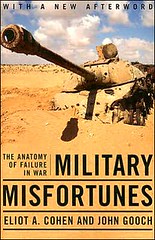The anatomy of failure in war
Last week I finished a book by Cohen and Gooch: "Military Misfortunes, The anatomy of failure in war."
Awkward, poorly-written and deficient in argumentation, it is nonetheless worth reading. The authors set out in a long beginning section to try to argue for an improved method of studying war. This is the weakest section, as they rely on sweeping, unsupported assertions, assumed reader complicity, and bad grammar to prove their case.
The inner sections, analyzing several notable military disasters, are much better-written.
They wrap up with a section restating that it's crucial to study organizational strengths and weaknesses of a military in order to improve it. Agreed, but why they wasted so much ink on baffling efforts to say so at the beginning of the book is a mystery.
Originally published in 1990, before Desert Storm, the book now contains an afterward that looks briefly at our current situation in Iraq. The authors point to two major failures: One was the failure to unify security operations and efforts to improve civilian infrastructure under a single commander (we split these duties among two directors who despised each other). A related but lesser failure was preferring instead to reward huge projects to Western firms, rather than employing Iraqis in reconstruction projects. The second major failure was the extended refusal to try to create an indigenous Iraqi security force charged with internal security (we dismissed the army, then tried to focus the new army against external threats, all while the insurgency was gathering steam). The authors are careful not to call Iraq a failure, though from what I could see before I read this book, it will go down as a textbook case.
The authors lay this failure to cope with the Iraqi insurgency at the tendency of the US military, after Vietnam, to focus on high-intensity warfare, giving counterinsurgency studies a pariah status.
I'm opposed to war as a first resort, and know that there is a huge amount of unexplored potential for achieving our interests in a way that not only avoids war but renders future wars less likely. But the reality is that, like it or not, the US is an imperial power now and will be fighting colonial wars of occupation against insurgents for decades to come. It's time we learned how to avoid them, and how to fight them.
Left grip is 28 pounds (25, 28, 25), right grip is 68 pounds (68, 67, 59), inhale volume is TK mL.



<< Home